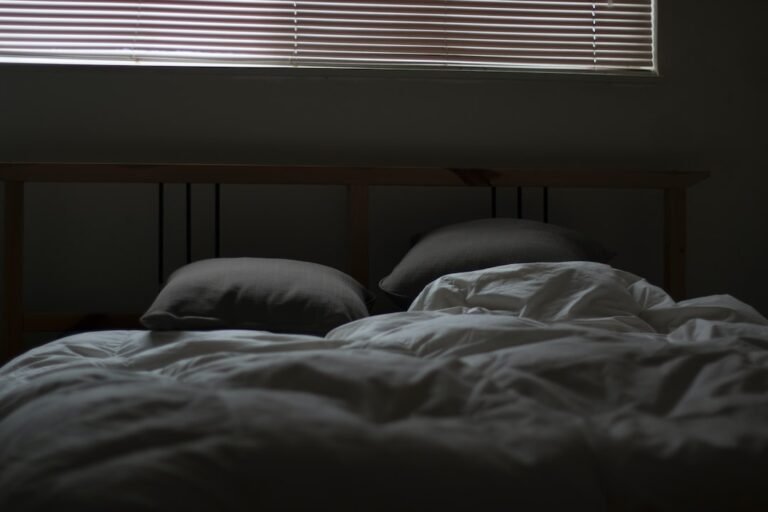Sleep Better, Live Better: A Holistic Approach to Improving Your Sleep
Sleep is a fundamental aspect of our lives that is often overlooked or undervalued. However, it plays a crucial role in our overall health and well-being. Getting enough quality sleep is essential for maintaining physical and mental health, as well as for promoting optimal cognitive function and emotional well-being. In this article, we will explore the importance of sleep for our overall health and well-being, the science behind sleep and its effects on our bodies and minds, common sleep disorders and how to identify them, natural remedies for better sleep, the role of nutrition in promoting restful sleep, mindfulness and meditation techniques for relaxation and stress reduction, the benefits of exercise for sleep quality and quantity, creating the perfect sleep environment, tips for improving sleep hygiene, and holistic approaches to sleep.
Understanding the Importance of Sleep for Optimal Health and Well-being
Sleep is not just a time when our bodies rest; it is a complex process that allows our bodies to repair and rejuvenate. During sleep, our bodies go through different stages that are essential for various functions such as memory consolidation, hormone regulation, immune system support, and tissue repair. Lack of sleep can have serious consequences on our physical health. It has been linked to an increased risk of chronic conditions such as obesity, diabetes, cardiovascular disease, and even certain types of cancer.
In addition to its physical benefits, sleep also plays a crucial role in our mental health. It is during sleep that our brains process information from the day and consolidate memories. Lack of sleep can impair cognitive function, memory recall, attention span, and decision-making abilities. It can also contribute to mood disorders such as depression and anxiety.
The Science of Sleep: How it Works and What Happens When We Don’t Get Enough
Sleep is divided into different stages that cycle throughout the night. These stages include non-rapid eye movement (NREM) sleep and rapid eye movement (REM) sleep. NREM sleep is further divided into three stages: N1, N2, and N3. Each stage has its own functions and characteristics. During N1, which is the lightest stage of sleep, we may experience drifting in and out of sleep and may be easily awakened. N2 is a deeper stage of sleep where our brain waves slow down and our body temperature drops. N3 is the deepest stage of sleep, also known as slow-wave sleep, where our brain waves are at their slowest and our body is in its most relaxed state.
When we don’t get enough sleep, our bodies and minds suffer. Sleep deprivation can lead to a variety of negative effects on our bodies, including impaired immune function, increased inflammation, hormonal imbalances, weight gain, and increased risk of chronic diseases. It can also have detrimental effects on our mental health, leading to mood swings, irritability, difficulty concentrating, memory problems, and increased risk of mental health disorders.
Common Sleep Disorders and How to Identify Them
There are several common sleep disorders that can disrupt our sleep and overall well-being. These include insomnia, sleep apnea, restless leg syndrome, and narcolepsy.
Insomnia is a sleep disorder characterized by difficulty falling asleep or staying asleep. It can be caused by various factors such as stress, anxiety, depression, certain medications, or underlying medical conditions. Insomnia can have a significant impact on our daily functioning and quality of life.
Sleep apnea is a condition where breathing repeatedly stops and starts during sleep. It can be caused by a blockage in the airway or a problem with the brain’s signaling to the muscles that control breathing. Sleep apnea can lead to excessive daytime sleepiness, loud snoring, morning headaches, and an increased risk of cardiovascular problems.
Restless leg syndrome is a neurological disorder characterized by an irresistible urge to move the legs during rest, often accompanied by uncomfortable sensations. It can make it difficult to fall asleep or stay asleep, leading to sleep deprivation and daytime fatigue.
Narcolepsy is a neurological disorder that affects the brain’s ability to regulate sleep-wake cycles. It is characterized by excessive daytime sleepiness, sudden loss of muscle tone (cataplexy), hallucinations, and sleep paralysis. Narcolepsy can significantly impact a person’s daily life and functioning.
If you suspect that you may have a sleep disorder, it is important to consult with a healthcare professional for proper diagnosis and treatment.
Natural Remedies for Better Sleep: Herbs, Supplements, and Essential Oils
Many people turn to natural remedies to improve their sleep quality. These remedies can help promote relaxation, reduce anxiety, and support healthy sleep patterns. Some popular herbs and supplements for sleep include valerian root, chamomile, lavender, melatonin, magnesium, and 5-HTP. These natural remedies can be taken in various forms such as teas, capsules, or tinctures.
Essential oils are another natural remedy that can promote relaxation and better sleep. Lavender oil is particularly known for its calming properties and is often used in aromatherapy to promote relaxation and improve sleep quality. Other essential oils that can be beneficial for sleep include chamomile, bergamot, ylang-ylang, and cedarwood.
It is important to note that while natural remedies can be helpful for improving sleep quality, they should not replace proper medical treatment for underlying sleep disorders or other health conditions. It is always best to consult with a healthcare professional before starting any new supplements or using essential oils.
The Role of Nutrition in Promoting Restful Sleep

What we eat can have a significant impact on our sleep quality. Certain foods contain nutrients that promote relaxation and support healthy sleep patterns. Foods rich in tryptophan, an amino acid that helps produce serotonin and melatonin, can be particularly beneficial for sleep. Some examples of tryptophan-rich foods include turkey, chicken, fish, nuts, seeds, tofu, and dairy products.
In addition to incorporating sleep-promoting foods into our diet, it is also important to avoid certain foods and beverages that can interfere with sleep. Caffeine, alcohol, and heavy meals close to bedtime can disrupt sleep and make it difficult to fall asleep or stay asleep.
Maintaining a balanced diet that includes a variety of nutrient-rich foods is essential for overall health and well-being, including sleep quality. It is also important to stay hydrated throughout the day, as dehydration can contribute to sleep disturbances.
Mindfulness and Meditation: Techniques for Relaxation and Stress Reduction
Mindfulness and meditation practices have been shown to be effective in reducing stress, promoting relaxation, and improving sleep quality. These practices involve focusing on the present moment and cultivating a non-judgmental awareness of our thoughts, feelings, and sensations.
Mindfulness meditation can be practiced in various ways, such as focusing on the breath, body scan meditation, or loving-kindness meditation. These practices can help calm the mind, reduce anxiety, and promote a sense of relaxation that can facilitate better sleep.
Incorporating mindfulness and meditation into our daily routine can be as simple as setting aside a few minutes each day to sit quietly and focus on our breath or engaging in a guided meditation practice. There are many resources available online or through mobile apps that offer guided meditations for sleep.
The Benefits of Exercise for Sleep Quality and Quantity
Regular exercise has been shown to have numerous benefits for sleep quality and quantity. Engaging in physical activity during the day can help regulate our circadian rhythm, increase the production of endorphins (feel-good hormones), reduce stress and anxiety, and promote relaxation.
Exercise has also been shown to improve sleep efficiency, which is the amount of time spent asleep compared to the total time spent in bed. It can help reduce the time it takes to fall asleep, decrease the number of awakenings during the night, and increase the overall duration of sleep.
It is important to note that while exercise can be beneficial for sleep, it is best to avoid vigorous exercise close to bedtime, as it can increase alertness and make it difficult to fall asleep. It is recommended to finish exercising at least a few hours before bedtime to allow the body to cool down and relax.
Creating the Perfect Sleep Environment: Tips for Comfort and Relaxation
Creating a comfortable sleep environment is essential for promoting restful sleep. This includes having a comfortable mattress and pillows that provide adequate support for your body. The ideal room temperature for sleep is typically between 60-67 degrees Fahrenheit (15-19 degrees Celsius), as cooler temperatures can promote better sleep.
It is also important to minimize noise and light in the bedroom. Using earplugs, white noise machines, or fans can help mask external noises and create a more peaceful sleep environment. Installing blackout curtains or using an eye mask can help block out light and create a darker sleeping environment.
In addition to these physical aspects, it is also important to create a relaxing bedtime routine that signals to your body that it is time to wind down and prepare for sleep. This can include activities such as reading a book, taking a warm bath or shower, practicing relaxation techniques, or listening to calming music.
Sleep Hygiene: Habits and Routines for a Better Night’s Rest
Sleep hygiene refers to the habits and routines that promote healthy sleep patterns. Good sleep hygiene practices can help regulate our circadian rhythm and promote better sleep quality.
Some tips for improving sleep hygiene include:
– Establishing a consistent sleep schedule by going to bed and waking up at the same time every day, even on weekends.
– Creating a relaxing bedtime routine that includes activities such as reading, taking a warm bath, or practicing relaxation techniques.
– Avoiding stimulating activities and electronic devices close to bedtime, as the blue light emitted by screens can interfere with the production of melatonin, a hormone that regulates sleep.
– Creating a comfortable sleep environment that is cool, dark, and quiet.
– Avoiding caffeine, alcohol, and heavy meals close to bedtime.
– Engaging in regular exercise during the day, but avoiding vigorous exercise close to bedtime.
Consistency is key when it comes to sleep hygiene. By establishing and maintaining a consistent sleep routine, we can train our bodies to recognize when it is time to sleep and optimize our sleep quality.
Holistic Approaches to Sleep: Integrating Mind, Body, and Spirit for Optimal Health
Taking a holistic approach to sleep involves integrating mind, body, and spirit for optimal health and well-being. This means addressing not only the physical aspects of sleep but also the mental, emotional, and spiritual aspects.
In addition to incorporating the various strategies mentioned earlier in this article, such as mindfulness and meditation practices, exercise, creating a comfortable sleep environment, and practicing good sleep hygiene, it is important to also address any underlying emotional or psychological factors that may be contributing to sleep disturbances.
This can involve seeking therapy or counseling to address stress, anxiety, or other mental health issues that may be interfering with sleep. It can also involve exploring spiritual practices or engaging in activities that promote emotional well-being and self-care.
By taking a holistic approach to sleep, we can create a more balanced and integrated approach to our overall health and well-being.
Sleep is an essential aspect of our lives that is often overlooked or undervalued. However, it plays a crucial role in our overall health and well-being. Getting enough quality sleep is essential for maintaining physical and mental health, promoting optimal cognitive function, and supporting emotional well-being.
By understanding the importance of sleep, the science behind it, and the various strategies and techniques that can promote better sleep, we can prioritize sleep and make it a priority in our lives. By prioritizing sleep and implementing healthy sleep habits, we can optimize our overall health and well-being. So, let’s make sleep a priority and reap the benefits of a good night’s rest.







